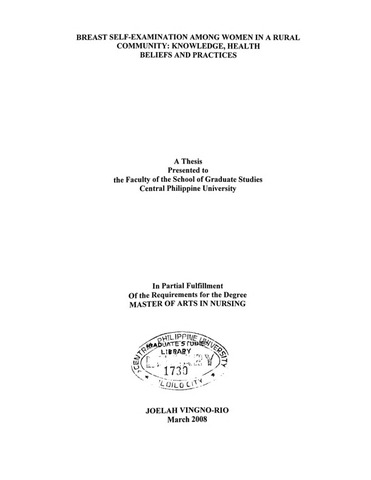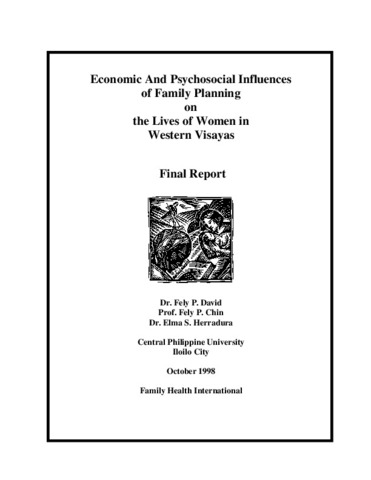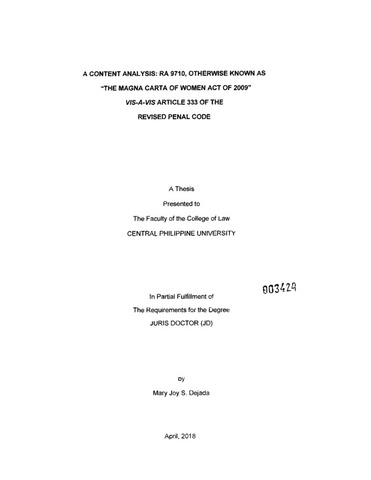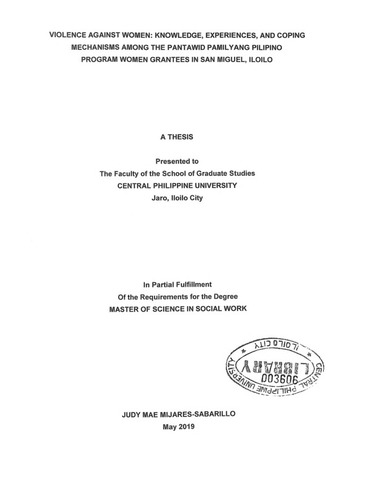Показать сокращенную информацию
Breast self-examination among women in a rural community: Knowledge, health beliefs and practices
| dc.contributor.author | Rio, Joelah V. | |
| dc.coverage.spatial | Iloilo | en_US |
| dc.date.accessioned | 2021-02-22T02:29:28Z | |
| dc.date.available | 2021-02-22T02:29:28Z | |
| dc.date.issued | 2008 | |
| dc.identifier.citation | Rio, J. V. (2008). Breast self-examination among women in a rural community: Knowledge, health beliefs and practices (Unpublished Master's thesis). Central Philippine University, Jaro, Iloio City. | en_US |
| dc.identifier.uri | https://hdl.handle.net/20.500.12852/487 | |
| dc.description | Abstract only | en_US |
| dc.description.abstract | The objectives of this study were to determine the knowledge about breast cancer and BSE, how it varies in terms of women’s characteristics like age, educational attainment and civil status. To determine whether their perceptions on their susceptibility to, on the seriousness of breast cancer, on benefit of and on barriers to BSE practices were significantly associated with their knowledge. To determine whether the respondent’s BSE practices was significantly associated with their characteristics, knowledge and perceptions about breast cancer and BSE. This is a descriptive-relational study and used one-shot survey design. This was conducted in Barangay Jalaud Norte, Zarraga, Iloilo - one of the communities in Iloilo province where Central Philippine University College of Nursing had their community health nursing affiliation. The respondents were 159 women, age 20 - 60 years old who were randomly pick from the Barangay household list. The interview schedule composed of three sections -the first, were asked the demographics of the respondent, the second, asked about the respondent’s knowledge about breast cancer and BSE, the third, asked about their perceived susceptibility to and perceived seriousness of breast cancer, their perception on the benefits of BSE and their perceived barriers to BSE. In this section, Champion’s Health Belief Model Scale was used, the fourth, asked about the respondent’s BSE practices. To determine the variations in the level of knowledge, the extent of perceptions and the respondent’s characteristics like age, civil status, educational attainment and family history of cancer, Z-test was used. Chi-square was used to determine the relationship between the respondent’s characteristics, level of knowledge, perceptions and BSE practices. The average age of the respondents were 40 years old, all of them had attended formal schooling. More than two-thirds were married and no family history of breast cancer or any other form of cancer. More than half have sufficient knowledge about breast cancer and BSE however, more than two-thirds of the respondents are not aware that overweight and obese individuals are high risk of developing breast cancer while almost two-thirds were not aware that aging contributes to their risk of having the disease. Almost the same proportions of respondents have a misconception that breast cancer only affects women and that only doctors and nurses can examine their breast well. Their knowledge about breast cancer and BSE significantly varies with educational attainment and civil status The majority of the respondents perceived moderate susceptibility to breast cancer, perceived breast cancer as a serious condition, perceived BSE as highly beneficial and perceived moderate barriers to BSE performance. Barriers to BSE performance that were identified includes; lack of time to perform BSE and lack of knowledge on how to do it. Their perceived susceptibility to breast cancer significantly varies with educational attainment. On their perceived seriousness of breast cancer, it significantly varies with age, educational attainment and civil status. Perceived benefits of BSE and perceived level of barriers to BSE significantly vary with age and educational attainment. The study shows however, that women’s perceptions are not significantly associated with their level of knowledge on breast cancer and BSE. Most of the respondents practice BSE but very few do it correctly and regularly. BSE performance shows a significantly association with perceived benefit of BSE and perceived barriers to BSE but does not show a significant association however, with the respondent’s age, educational attainment, civil status, family history of cancer, level of knowledge about breast cancer and BSE, perceived susceptibility to and perceived seriousness of breast cancer. | en_US |
| dc.format.extent | xv, 84 leaves | en_US |
| dc.language.iso | en | en_US |
| dc.subject.ddc | GSL Theses 610.73072 R476 | en_US |
| dc.subject.lcsh | Breast--Cancer | en_US |
| dc.subject.lcsh | Breast--Examination | en_US |
| dc.subject.lcsh | Rural women | en_US |
| dc.subject.lcsh | Rural women--Health and hygiene | en_US |
| dc.subject.lcsh | Women | en_US |
| dc.subject.lcsh | Women--Health and hygiene | en_US |
| dc.subject.lcsh | Health behavior | en_US |
| dc.subject.lcsh | Philippines--Iloilo (Province) | en_US |
| dc.subject.mesh | Awareness | en_US |
| dc.subject.mesh | Health Behavior | en_US |
| dc.subject.mesh | Women | en_US |
| dc.subject.mesh | Women's Health | en_US |
| dc.subject.mesh | Breast Neoplasms | en |
| dc.subject.mesh | Neoplasms | en |
| dc.title | Breast self-examination among women in a rural community: Knowledge, health beliefs and practices | en_US |
| dc.type | Thesis | en_US |
| dc.description.bibliographicalreferences | Includes bibliographical references | en_US |
| dc.contributor.chair | David, Fely P. | |
| dc.contributor.committeemember | Delica, Lilia A. | |
| dc.contributor.committeemember | Yoro, Carolyn L. | |
| dc.contributor.committeemember | Gubatanga, Virginia J. | |
| dc.contributor.committeemember | Chin, Fely P. | |
| dc.contributor.department | School of Graduate Studies | en_US |
| dc.description.degree | Master of Arts in Nursing | en_US |





